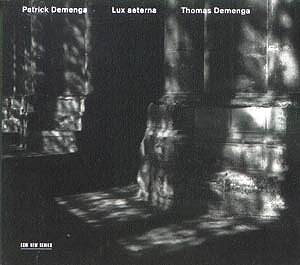Barriere Sonata No 10;
Demenga Duo? O, Du ...;
Guy Redshift;
Knaifel Lux aeterna;
Moser Wendungen.
 Patrick & Thomas Demenga
(cellos)
Patrick & Thomas Demenga
(cellos)
 ECM New Series 465 341-2
[65 min]
ECM New Series 465 341-2
[65 min]
Crotchet
Amazon
UK

Unique, and ever likely to remain so, this cello-duo recital by two gifted
Swiss brothers contrasts wild flights of fancy by the 18C French cellist/composer
Jean Barriere (1705-47) with modern works which challenge the open minded
listener with contrasting idioms.
Thomas Demenga has previously coupled Bach suites with modern
compositions. As composer, he contributes a piece written to play with his
younger brother which starts with compound rhythms that become disrupted
with catastrophic interruptions before trying to re-establish themselves.
Roland Moser launches into complex pizzicato patterns in his Wendunken
(which might be translated as turn around) and finally reaches a melodic
'song' which resolves the earlier conflicts. Barry Guy (double bass virtuoso,
so no stranger to the capabilities of lower strings) exploits advanced playing
techniques and goes through a multitude of changes of character and evanescent
moods, recalling Guy's own free-jazz improvisations. Episodes of stasis give
way to frenetic activity and mysterious wisps of tone, before he returns
to the rhythmic figures with which he began, accompanying now a grave ascending
melody which ascends into the highest register before evaporating with a
question mark.
For me, the tough nut here was the CD's title piece, Alexander Knaifel's
long meditation 'for two psalm singers' upon fragments from the Psalms, with
the cellists required to intone vocally, besides maintaining concentration
over long spans; the effect is hypnotic - or a turn off, depending on your
personality and patience.
The rest is a splendid mixture of modern experiments for this unusual sibling
duo. Rapport is close as one might hope. It is all played with total assurance
and conviction and would broaden the minds of any cellists, prompting them
to reconsider their well-worn repertoires, which tend to recycle familiar
pieces from the instrument's canon of guaranteed masterworks. One or two
of these pieces would wake up complacent listeners, but the CD provokes too
many thoughts to digest straight off. Barriere is a composer worth anyone's
time and should take a regular place in cello recitals for those players
who can cope with his demands, both expressive and technical, but I think
I would recommend saving it as a pleasure to be deserved after listening
to the other items on this testing programme, testing for listeners as for
performers.
Peter Grahame Woolf

